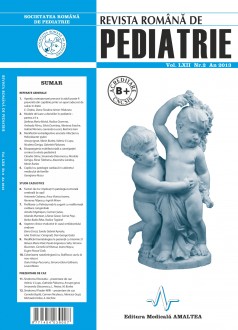SELECT ISSUE

Indexed

| |

|
|
|
| |
|
|
|

|
|
|
|
|
|
|
HIGHLIGHTS
National Awards “Science and Research”
NEW! RJP has announced the annually National Award for "Science and Research" for the best scientific articles published throughout the year in the official journal.
Read the Recommendations for the Conduct, Reporting, Editing, and Publication of Scholarly work in Medical Journals.
The published medical research literature is a global public good. Medical journal editors have a social responsibility to promote global health by publishing, whenever possible, research that furthers health worldwide.
Prader-Willi syndrome – case report
Camelia Buşilă, Carmen Niculescu, Maricica Guşă, Michaela Dobre and A. Nechita
ABSTRACT
Study objective. The objective of the present study is to introduce the diagnosis steps of a rare disease, Prader-Willi Syndrome. Materials and methods. The patient, aged 15 years, was admitted to the Clinical Emergency Hospital for Children “Sf. Ioan” with productive cough and dyspnea. Considering the morbid obesity, mental retardation and other phenotypic aspects noticed when she was admitted, further specialized tests and examinations were recommended (neurological, ENT, endocrinology, orthopedics, gynecology). After the correlation of this disease history with clinical examination and laboratory results, the suspected diagnosis was that of Prader-Willi Syndrome. The genetic analysis was recommended for diagnostic evaluation. Results. Laboratory tests revealed glucose metabolism disorder and hypothyroidism, endocrinological examination suggesting hypothalamic-pituitary etiology of morbid obesity. Gynecological exam found normal anatomically conformation, absent pituitary function, no changes on adrenarche, sex hormones almost absent, no indication of substitutive treatment. ACTH deficiency was correlated with cortisol deficiency. Genetic analysis (FISH, molecular probe D15S10) showed microdeletion on the long arm of chromosome 15 between bands q11-q13, confirming the diagnosis of Prader-Willi syndrome. Conclusion. The results of expert examination and laboratory investigations played an important role in setting the diagnosis but its confirmation is due to genetic testing. Our case highlights once again the need and importance of molecular diagnostic techniques in clinical practice.
Key words: rare diseases, Prader-Willi Syndrome, FISH
